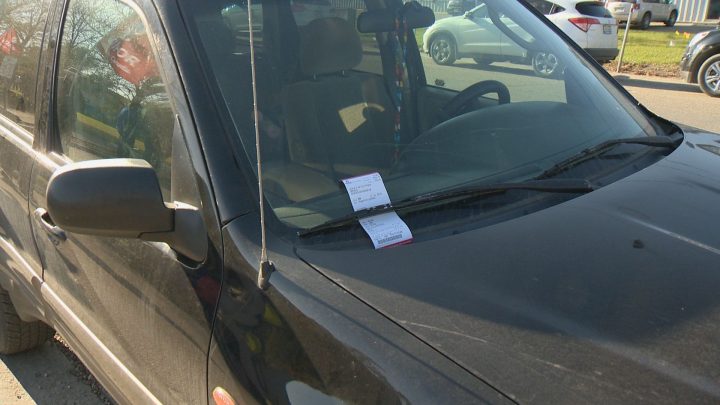UPDATE: Unifor announced on Monday night that workers will be returning to the picket line on Tuesday. The union says the move is to show solidarity with locked out SaskTel employees.

Earlier in the day, SaskTel announced that they would not allow Unifor employees to return on a work to rule basis. SaskPower and SaskEnergy both said they would allow workers to return.
The original article continues below…
Striking Crown corporation workers blockaded SaskTel call centres Monday as their job action entered its fourth day.
Unifor picketers parked vehicles so they blocked the driveways to the call centre in Regina’s industrial end, and formed lines behind the vehicles.
“We have the ability to flex our muscles, move around wherever we need, and we will until they want to come back and talk to us.”
The strike involves 5,000 Unifor members from six Crown corporations and one agency. The companies involved are SaskTel, SaskPower, SaskEnergy, SaskWater, the Water Security Agency and two SaskTel; DirectWest and SecurTek.
The Crowns have essential service plans in place, dealing with issues like power outages, gas leaks and the 911 call centre.
SaskTel’s consumer call centres are meant to be open, allowing customers to change home services during the strike. The goal of Monday’s blockade is to prevent these services from being delivered.
Back to work Tuesday

Get daily National news
The job action will take a different tone on Tuesday. On Monday morning, striking workers were told to call their managers and say they plan on being at work for their shifts on Tuesday. It will not be a full return to work, employees will be back on a work to rule basis. This means only doing the minimum work laid out in their contract and no overtime.
“We can pull our resources, we can put our resources back, we can put in work to rule, we can mix it up. Part of that is what we’ve done today; we’re mixing things up,” Kuntz said.
“Tomorrow, returning to work in a work to rule state. It’s within our rights. There’s been no lockout notices issued by any of the employers so we’re going to take advantage of that.”
SaskTel said Unifor employees that show up for work Tuesday morning will not be allowed to do their duties. The company says they will not be able to provide their desired level of customer service with “unknown and intermittent walkouts.”
The SaskTel statements adds that Unifor will only give 24-hour notice if workers go back on strike. According to SaskTel, they need 48 hours to get their business processes, systems, and employee accesses fully reinstated.
Additionally, SaskTel said they may seek an injunction to stop Unifor’s “illegal labour disruption activities.” This includes blocking out-of-scope employees from working at the call centre Monday.
The company also alleged Unifor members are putting in fictitious orders to potentially disrupt client services.
Both SaskPower and SaskEnergy said Unifor employees will be allowed to return to work on Tuesday.
The SaskEnergy spokesperson said that some customer services will take time to get back online, and could not be ready until Wednesday.
According to SaskPower, the only change customers should notice is the call centre hours will be 9 a.m. to 4 p.m. instead of 10 a.m. to 3 p.m.
Potential rationale for return to work
So why return to work without a contract in place? University of Regina business administration associate professor Andrew Stevens thinks it may be to make things inconvenient for employers.
“As a manager if it’s going to be a long strike you can plan accordingly, use trained supervisors and other out of scope staff to do their jobs, you have some predictability. There might even be a threat of replacement workers without any anti-scab legislation. Management can’t use that tactic here,” Stevens said.
On top of that, Stevens said this hinders any consideration of back-to-work legislation because you can’t really bring it in if workers return to their duties.
As employees of publicly owned Crowns, Stevens also speculated that there could be a public relations angle to the anticipated return to work.
“They have to maintain some semblance of support from and with the public. This way, you’re going to see managers, employers and the Crowns more disrupted than the general public,” Stevens explained.
Both the union and government say they are ready to return to the table, but Kuntz said there has been no official discussion as of Monday morning.
Wages are the biggest sticking point between the two sides. According to a posting on Unifor’s website, the employer offer is no increase for the first two years of the contract, followed by a one per cent increase and two per cent raises in the final two years of the contract.
Finance Minister Donna Harpauer has said this is a fair deal that works out to a five per cent pay increase over five years.
Kuntz said this offer doesn’t match the increased cost of living. He said the province established what that is by giving MLAs a 2.3 per cent cost of living increase on April 1.









Comments
Want to discuss? Please read our Commenting Policy first.